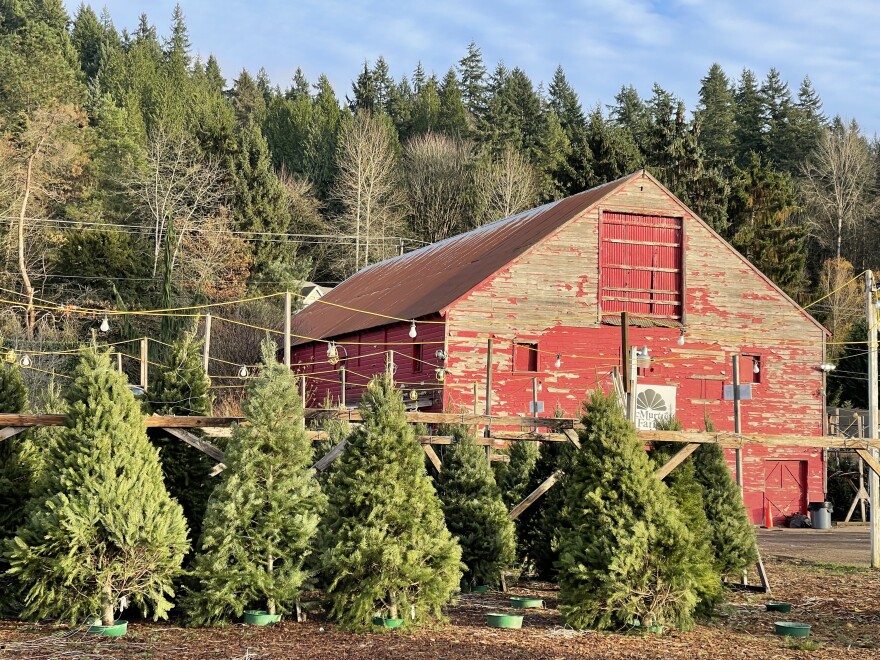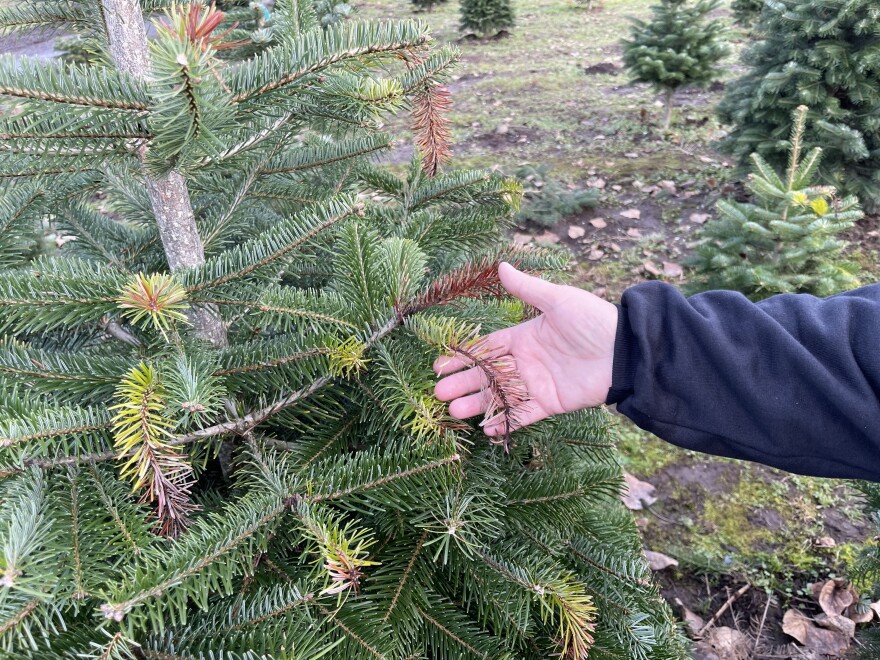At McMurtrey Farm in Woodinville, a picturesque red barn looms over rows and rows of young evergreens. A rack of handsaws alongside the entrance to the fields invites visitors to find and cut their own trees. Between the rows, families like Eric Heller and his two young children wander, hunting for the perfect one to bring home.
As his kids splash in a puddle, Heller explains that they came from Lynnwood, hoping for something in the 7- to 8-foot range. They’re not finding it here.

“There are a lot of short trees. So, it looks like they’ve either been picked clean or running low,” he said.
It’s Dec. 3. And it’s already the last day for U-cut sales at this farm — because Heller is right: Almost none of the trees left growing here are big enough to be cut. After just a week of sales, the farm will sell only cut trees that they’ve brought in from other growers.
“Definitely we have fewer trees this year,” said co-owner Jana Sifuentes.
With a bailer still constantly wrapping trees in the background, she says there are a lot of reasons for the shortage. They have 12 acres of farmland here. But development pressure in this suburban area has cut into some of that recently: It’s changed the soil.
“And as you can see out here, there's a lot of green out there,” she said, pointing out beyond the evergreens.
“That's a part of our land that's getting wetter and wetter as the water table rises. And so we can't grow trees there. And because of that, we only have a limited supply," Sifuentes explained.
Sifuentes and her husband have owned the farm for 21 years. She says also affecting them this year is something they’d never seen before: the heat dome that sent temperatures soaring to 110 degrees in their fields in June. It left its mark on many of their mature trees.
“As you walk through the farm, you'll notice that some of these trees have brown on them on the southwest side. That's not a disease; that is sunburn.”
Tender new growth that came in May got fried. Sifuentes says the heat also killed a lot of seedlings, here and everywhere. Christmas trees grow about a foot per year, so that may cause a shortage five or six years from now.

It didn’t affect her fields too dramatically. But McMurtrey Farm always brings in cut trees to meet demand in their busy location, and one of her suppliers was extremely hard hit by the heat dome.
“We were able to get in the trees that we needed to, but definitely the one grower was short,” Sifuentes said.
And she says there are fewer and fewer really tall trees. It’s hard to get anything over 7 feet, and those sell out very quickly. That’s an industry-wide issue, with causes that go back at least to the economic downturn of 2008. Many growers got out of the business. Increasingly intense wildfires have also hurt some tree farmers in the region.
Some of that has rebounded, but there’s been a steady drop in the acreage used by licensed Christmas tree growers in the state, says Shelley Sprouffske. She serves on the state Department of Agriculture's Christmas Tree Grower Advisory Committee.
“In the state of Washington this year, nearly a quarter of the growers did not renew their licenses for the year 2021,” Sprouffske said.
She co-owns a family Christmas tree farm in Rainier in Thurston County and says, at the same time that licenses and farmed acres are going down, demand has gone up during the pandemic. This is especially true for U-cut farms like hers and McMurtrey, where people come to get that traditional, outdoor holiday experience.
All of this is a recipe for higher prices. Sprouffske says buyers shouldn’t be surprised if they see that.
“Many farms are raising their prices right now to offset the lower supply,” she said.
But, back at McMurtrey Farm in Woodinville, Sifuentes says she didn’t have a heart to raise prices, even though costs have gone up by 8 to 10 percent. She says despite all the talk of shortages, there are plenty of trees to go around. She still has hundreds on her lot. But she says, they sometimes run out as early as Dec. 17 or 18.
“You know, if you're waiting for the college kids to come home to go get that Christmas tree, you may not want to," Sifuentes said.
“I think we're going to be good this year, and I think we'll continue to have trees. But, yeah, you really don't want to wait until the last minute if you can possibly help it."
And if you do wait, be prepared to shop around and don’t be picky.








